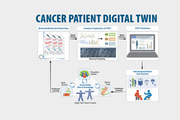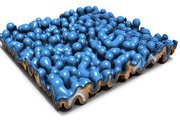Did you know we have a monthly newsletter? View past volumes and subscribe.
An open-source, data-science toolkit for energy: GridDS
Aug. 2, 2022 -
As the number of smart meters and the demand for energy is expected to increase by 50% by 2050, so will the amount of data those smart meters produce. While energy standards have enabled large-scale data collection and storage, maximizing this data to mitigate costs and consumer demand has been an ongoing focus of energy research. An LLNL team has developed GridDS—an open-source, data-science...
Defending U.S. critical infrastructure from nation-state cyberattacks
July 21, 2022 -
For many years, LLNL has been conducting research on cybersecurity, as well as defending its systems and networks from cyberattacks. The Lab has developed an array of capabilities to detect and defend against cyberintruders targeting IT networks and worked with government agencies and private-sector partners to share its cybersecurity knowledge to the wider cyberdefense community. LLNL has...
Assured and robust…or bust
June 30, 2022 -
The consequences of a machine learning (ML) error that presents irrelevant advertisements to a group of social media users may seem relatively minor. However, this opacity, combined with the fact that ML systems are nascent and imperfect, makes trusting their accuracy difficult in mission-critical situations, such as recognizing life-or-death risks to military personnel or advancing materials...
CASC team wins best paper at visualization symposium
May 25, 2022 -
A research team from LLNL’s Center for Applied Scientific Computing won Best Paper at the 15th IEEE Pacific Visualization Symposium (PacificVis), which was held virtually on April 11–14. Computer scientists Harsh Bhatia, Peer-Timo Bremer, and Peter Lindstrom collaborated with University of Utah colleagues Duong Hoang, Nate Morrical, and Valerio Pascucci on “AMM: Adaptive Multilinear Meshes.”...
NNSA and Cornelis Networks to collaborate on next-generation high-performance networking
May 4, 2022 -
The Next-Generation High Performance Computing Network (NG-HPCN) project for the NNSA’s Advanced Simulation and Computing (ASC) program will enable NNSA to co-design and partner with Cornelis on development and productization of next-generation interconnect technologies for HPC. The project is led by LLNL for the NNSA Tri-Labs: LLNL, Los Alamos and Sandia national laboratories. The resulting...
Accelerating the path to precision medicine
March 22, 2022 -
LLNL joined the Transforming Research and Clinical Knowledge in Traumatic Brain Injury (TRACK-TBI) consortium in 2018. The national, multiyear, multidisciplinary effort, led by the University of California at San Francisco in collaboration with Lawrence Berkeley and Argonne national laboratories and other leading research organizations and universities, combines neuroimaging, blood-based...
COVID-19 R&D: Computing responds to pandemic
Jan. 19, 2022 -
When the COVID-19 pandemic began, the Laboratory immediately started seeking solutions to the myriad challenges posed by the global crisis. The Computing Directorate jumped right in with research and development activities that combine molecular screening to inform antiviral drug experimentation; a generative molecular design software platform to optimize properties of antiviral drugs; an...
Unprecedented multiscale model of protein behavior linked to cancer-causing mutations
Jan. 10, 2022 -
LLNL researchers and a multi-institutional team have developed a highly detailed, machine learning–backed multiscale model revealing the importance of lipids to the signaling dynamics of RAS, a family of proteins whose mutations are linked to numerous cancers. Published by the Proceedings of the National Academy of Sciences, the paper details the methodology behind the Multiscale Machine...
LLNL establishes AI Innovation Incubator to advance artificial intelligence for applied science
Dec. 20, 2021 -
LLNL has established the AI Innovation Incubator (AI3), a collaborative hub aimed at uniting experts in artificial intelligence (AI) from LLNL, industry and academia to advance AI for large-scale scientific and commercial applications. LLNL has entered into a new memoranda of understanding with Google, IBM and NVIDIA, with plans to use the incubator to facilitate discussions and form future...
Digital twins for cancer patients could be ‘paradigm shift’ for predictive oncology
Dec. 16, 2021 -
A multi-institutional team, including an LLNL contributor, has proposed a framework for digital twin models of cancer patients that researchers say would create a “paradigm shift” for predictive oncology. Published online Nature Medicine on November 25, the proposed framework for Cancer Patient Digital Twins (CPDTs) — virtual representations of cancer patients using real-time data — would...
Building confidence in materials modeling using statistics
Oct. 31, 2021 -
LLNL statisticians, computational modelers, and materials scientists have been developing a statistical framework for researchers to better assess the relationship between model uncertainties and experimental data. The Livermore-developed statistical framework is intended to assess sources of uncertainty in strength model input, recommend new experiments to reduce those sources of uncertainty...
Lab-led effort one of nine DOE-funded data reduction projects
Sept. 17, 2021 -
An LLNL-led effort in data compression was one of nine projects recently funded by the DOE for research aimed at shrinking the amount of data needed to advance scientific discovery. Under the project—ComPRESS: Compression and Progressive Retrieval for Exascale Simulations and Sensors—LLNL scientists will seek better understanding of data-compression errors, develop models to increase trust in...
Laser-driven ion acceleration with deep learning
May 25, 2021 -
While advances in machine learning over the past decade have made significant impacts in applications such as image classification, natural language processing and pattern recognition, scientific endeavors have only just begun to leverage this technology. This is most notable in processing large quantities of data from experiments. Research conducted at LLNL is the first to apply neural...
The data-driven future of extreme physics
May 19, 2021 -
By applying modern machine learning and data science methods to “extreme” plasma physics, researchers can gain insight into our universe and find clues about creating a limitless amount of energy. In a recent perspective published in Nature, LLNL scientists and international collaborators outline key challenges and future directions in using machine learning and other data-driven techniques...
Advanced Data Analytics for Proliferation Detection shares technical advances during two-day meeting
May 7, 2021 -
The Advanced Data Analytics for Proliferation Detection (ADAPD) program held a two-day virtual technical exchange meeting recently. The goal of the meeting was to highlight the science-based and data-driven analysis work conducted by ADAPD to advance the state-of-the-art to accelerate artificial intelligence (AI) innovation and develop AI-enabled systems to enhance the United States’...
Virtual seminar series explores data-driven physical simulations
April 6, 2021 -
The rapidly growing fields of artificial intelligence (AI) and machine learning (ML) have become cornerstones of LLNL’s data science research activities. The Lab’s scientific community regularly publishes advancements in both AI/ML applications and theory, contributing to international discourse on the possibilities of these compelling technologies.
The large volume of AI/ML scientific...
Lab researchers explore ‘learn-by-calibration’ approach to deep learning to accurately emulate scientific process
Feb. 10, 2021 -
An LLNL team has developed a “Learn-by-Calibrating” method for creating powerful scientific emulators that could be used as proxies for far more computationally intensive simulators. Researchers found the approach results in high-quality predictive models that are closer to real-world data and better calibrated than previous state-of-the-art methods. The LbC approach is based on interval...
CASC research in machine learning robustness debuts at AAAI conference
Feb. 10, 2021 -
LLNL’s Center for Applied Scientific Computing (CASC) has steadily grown its reputation in the artificial intelligence (AI)/machine learning (ML) community—a trend continued by three papers accepted at the 35th AAAI Conference on Artificial Intelligence, held virtually on February 2–9, 2021. Computer scientists Jayaraman Thiagarajan, Rushil Anirudh, Bhavya Kailkhura, and Peer-Timo Bremer led...
DOE announces five new energy projects at LLNL
Nov. 13, 2020 -
The DOE today announced two rounds of awards for the High Performance Computing for Energy Innovation Program HPC4EI), including five projects at LLNL. HPC4EI connects industry with the computational resources and expertise of the DOE national laboratories to solve challenges in manufacturing, accelerate discovery and adoption of new materials and improve energy efficiency. The awards were...
What put LLNL at the center of U.S. supercomputing in 2020?
Nov. 12, 2020 -
The HPC world is waiting for the next series of transitions to far larger machines with exascale capabilities. By this time next year, the bi-annual ranking of the Top500 most powerful systems will be refreshed at the top as Frontier, El Capitan, Aurora, and other DOE systems come online. While LLNL was already planning around AI acceleration for its cognitive simulation aims and had a number...























